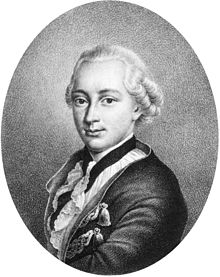Joseph Gottlieb Kölreuter
| Joseph Gottlieb Kölreuter | |
|---|---|
 |
|
| Born | 27 April 1733 Sulz am Neckar, Holy Roman Empire |
| Died |
11 November 1806 (aged 73) Karlsruhe, Germany |
| Known for | Reciprocal cross |
Joseph Gottlieb Kölreuter (27 April 1733 – 11 November 1806), also spelled Koelreuter or Kohlreuter, was a German botanist who pioneered the study of plant fertilization, hybridization and was the first to detect self-incompatibility. He was an observer as well as a rigorous experimenter who used careful crossing experiments although he did not inquire into the nature of heritability.
Kölreuter was the oldest of three sons of an apothecary in Karlsruhe, Germany, and grew up in Sulz. He took an early interest in natural history and made a collection of local insects. At the age of fifteen he went to study medicine at the University of Tübingen under physician and botanist Johann Georg Gmelin who had returned from St. Petersburg. Gmelin had an interest in floral biology and he reprinted a work by Rudolf Jakob Camerarius (who also taught at Tübingen) who was the first to demonstrate sexual reproduction in plants. In his inaugural address in 1749 Gmelin talked the need for research on the origin of new species by hybridization. This may have had an influence on Kölreuter. Gmelin died in 1755, and Kolreuter earned his degree and received an appointment at the Imperial Academy of Sciences at St. Petersburg on 23 December 1755. Here his work included botany as well as the curation of the fish and coral collections. He stayed on until 6 June 1761. From 1759 he experimented on plant hybridization before returning to Germany. He moved to Calw in 1763 and Karlsruhe in 1764 where he was briefly professor of natural history and director of the botanical garden at Baden. He was dismissed from the botanical garden after a dispute with the head gardener in 1783 but stayed as a professor until 1806 when he died.
Kölreuter followed the standard idea of the period of plants and nature personified by a Creator. He expected patterns for instance homogeneity in the male and female contributions to the progeny. He also strongly believed in epigenetic influences which may have been derived from the teachings of C. F. Wolff. According to Kölreuter there had to be two uniform fluids, male and female semen which combined in the process of fertilization. He believed that equal quantities of the male and female fluid were needed and he therefore examined how much pollen was needed in fertilization of a given number of seeds. In flowers with multiple stigmas, he cut all but one and found that pollinating it was enough to fertilize all the seeds. He examined the action of stigma fluid on pollen. described many plant species, and studied pollen and its transfer.
...
Wikipedia
